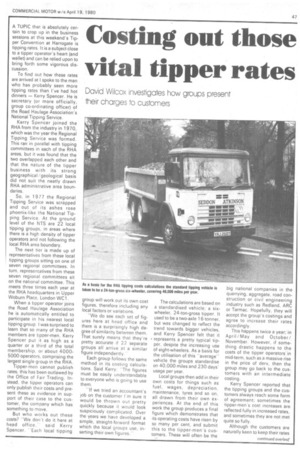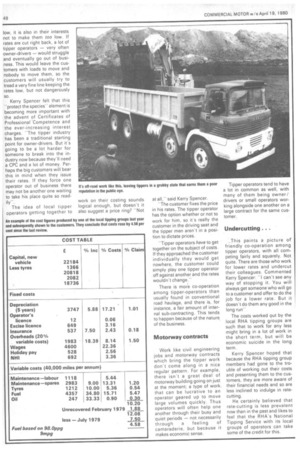Costing out those vital tipper rates
Page 49

Page 50

If you've noticed an error in this article please click here to report it so we can fix it.
David Wilcox investigates how groups present their charges to customers
A TOPIC that is absolutely certain to crop up in the business sessions at this weekend's Tipper Convention at Harrogate is tipping rates. It is a subject close to a tipper operator's heart (and wallet) and can be relied upon to bring forth some vigorous discussion.
To find out how these rates are arrived at I spoke to the man who has probably seen more tipping rates than I've had hot dinners — Kerry Spencer. He is secretary (or more officially, group co-ordinating officer) of the Road Haulage Association's National Tipping Service.
Kerry Spencer joined the RHA from the industry in 1970, which was the year the Regional Tipping Service was formed. This ran in parallel with tipping committees in each of the RHA areas, but it was found that the two overlapped each other and that the nature of the tipper business with its strong geographical /geological basis did not suit the neatly drawn RHA administrative area boundaries.
So, in 1977 the Regional Tipping Service was scrapped and out of its ashes rose phoenix-like the National Tipping Service. At the ground level of the NTS are 22 local tipping groups, in areas where there is a high density of tipper operators and not following the local RHA area boundary.
The next tier is made up of representatives from these local tipping groups sitting on one of seven regional committees. In turn, representatives from these seven regional committees sit on the national committee. This meets three times each year at the RHA headquarters in Upper Woburn Place, London WC1.
When a tipper operator joins the Road Haulage Association he is automatically entitled to participate in his nearest local tipping group. I was surprised to learn that so many of the RHA members are tipper-men. Kerry Spencer put it as high as a quarter or a third of the total membership, or about 40005000 operators, comprising the largest single group in the RHA.
Tipper-men cannot publish rates; this has been outlawed by the Office of Fair Trading. Instead, the tipper operators can only publish their costs and present these as evidence in sup port of their case to the customer, the company which has something to move.
But who works out these costs? "We don't do it here at head office, said Kerry Spencer. "Each local tipping group will work out its own cost figures, therefore including any local factors or variations.
'We do see each set of figures here at head office and there is a surprisingly high degree of similarity between them. That surely means that they're pretty accurate if 22 separate groups all arrive at a similar figure independently,'
Each group follows the same method in its costing calculations. Said Kerry: -The figures must be easily understandable to everyone who is going to use them.
''If we tried an accountant's job on the customer I'm sure it would be thrown out pretty quickly because it would look suspiciously complicated. Over the years we have developed a simple, straight-forward format which the local groups use, inserting their own figures." The calculations are based on a standardised vehicle; a sixwheeler, 24-ton-gross tipper. It used to be a two-axle 16-tonner, but was changed to reflect the trend towards bigger vehicles, and Kerry Spencer felt that it represents a pretty typical tipper, despite the increasing use of eight-wheelers. As a basis for the utilisation of this "average" vehicle the groups standardise on 40,000 miles and 230 days' usage per year.
Local groups then add in their own costs for things such as fuel, wages, depreciation, maintenance, tyres and so on, all drawn from their own experiences. At the end of this work the group produces a final figure which demonstrates that its operating costs have risen by so many per cent, and submit this to the tipper-men's customers. These will often be the .big national companies in the quarrying, aggregate, road construction or civil engineering industry such as Redland, ARC or Tarmac. Hopefully, they will accept the group's costings and agree to increase their rates accordingly.
This happens twice a year; in April/May and October/. November. However, if something drastic happens to the costs of the tipper operators in mid-term, such as a massive rise in the price of derv, then the group may go back to the cus-, tomers with an intermediate costing.
Kerry Spencer reported that the tipping groups and the customers always reach some form of agreement; sometimes the tipper-men's cost increases are reflected fully in increased rates, and sometimes they are not met quite so fully.
Although the customers are naturally keen to keep their rates continued overleaf
low, it is also in their interests not to make them too low. If rates are cut right back, a lot of tipper operators very often owner-drivers would struggle and eventually go out of business. This would leave the customers with loads to move and nobody to move them, so the customers will usually try to tread a very fine line keeping the rates low, but not dangerously so.
Kerry Spencer felt that this protect the species" element is becoming more important with the advent of Certificates of Professional 'Competence and the ever-increasing interest charges. "The tipper industry has been a traditional starting point for owner-drivers. But it's going to be a lot harder for someone to break into the industry now because they'll need a CPC and a lot of money. Perhaps the big customers will bear this in mind when they issue their rates. If they force one operator out of business there may not be another one waiting to take his place quite so readily".
The idea of local tipper operators getting together to work on their costing sounds logical enough, but doesn't it also suggest a price ring? "Not at all," said Kerry Spencer.
"The customer fixes the price in his rates. The tipper operator has the option whether or not to work for him, so it's really the customer in the driving seat and the tipper men aren't in a position to dictate prices.
"Tipper operators have to get together on the subject of costs. If they approached the customer individually they would get nowhere, the customer could simply play one tipper operator . off against another and the rates wouldn't change."
There is more co-operation among tipper-operators than usually found in conventional road haulage, and there is, for instance, a fair amount of internal sub-contracting. This tends to happen because of the nature. of the business.
Motorway contracts
Work like civil engineering jobs and motorway contracts which bring the tipper work don't come along in a nice regular pattern. For example, there isn't a great deal of motorway building going on just at the moment; a type of work, that can be lucrative to an operator geared up to move large volumes quickly. Thus operators will often help one another through their busy and quiet periods not necessarily through a feeling of camaraderie, but because it makes economic sense. Tipper operators tend to have a lot in common as well, with many of them being owner! drivers or small operators working alongside one another on a large contract for the same customer.
Undercutting . . .
This paints a picture of friendly co-operation among tipper operators, with all competing fairly and squarely. Not quite. There are those who work for lower rates and undercut their colleagues. Commented Kerry Spencer: "I can't see any way of stopping it. You will always get someone who will go to a customer and offer to do the job for a lower rate. But it doesn't do them any good in the long run'' The costs worked out by the local RHA tipping groups are such that to work for any less might bring in a lot of work in the short term, but will be economic suicide in the long term.
Kerry Spencer hoped that because the RHA tipping group membershad gone to the trouble of working out their costs and presenting them to the customers, they are more aware of their financial needs and so are less inclined to indulge in ratecutting.
He certainly believed that rate-cutting is less prevalent now than in the past and likes to feel that the RHA's National Tipping Service with its local groups of operators can take some of the credit for this.












































































































